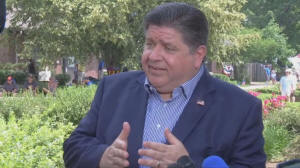Some question reality of Illinois' budget surplus
 Send a link to a friend
Send a link to a friend
 [July 15, 2023]
By Andrew Hensel | The Center Square [July 15, 2023]
By Andrew Hensel | The Center Square
(The Center Square) – Gov. J.B. Pritzker has been touting Illinois'
budget surplus for the fiscal year that just ended. However, some
financial analysts believe a surplus is impossible for the state.
At more than $50.4 billion in spending, the state's budget that started
July 1 is the largest in the state's history.
For the previous fiscal year that ended June 30, the Illinois Commission
on Government Forecasting and Accountability reported the “base” receipt
actual total was $50.7 billion. That is $295 million higher than the
commission’s May 2023 forecast of $50.4 billion. The report shows the
actual was $726 million above the Governor’s Office of Management and
Budget’s May 2023 revised forecast of $50.7 billion.
According to Pritzker, he’s managing a surplus.
"It's always good to have a surplus, and that's something we've done
consistently now for four years," Pritzker said. "I would add that much
of the surplus we saw that came in at the end of the year is one-time
dollars that were added to our revenues."

Pritzker said it is the first substantial budget surplus the state has
had in a long time.
"It is the first real significant surplus we have had because we have
taken all the surpluses in the previous years and assigned them to those
one-time expenditures," Pritzker said.
[to top of second column]
|

Illinois Gov. J.B. Pritzker
Illinois.gov

Sheila Weinberg of Truth in Accounting told The Center Square that
the state has too many outstanding bills to have a true budget
surplus.
"The state continuously does not pay its pension payments," Weinberg
said. "I would say that, is the state really running a budget
surplus of more than $700 million if they are not contributing the
proper amount into their pension?"
Illinois has around $140 billion in unfunded state employee pension
liabilities that doesn't include annual costs of other post
employment benefits.
Weinberg said any budget surplus that the governor claims the state
has is due to new taxes and money from the federal government.
"It comes from a lot of federal money that is not going to continue
and from additional taxes that were collected," Weinberg said. "This
would be like me saying, 'hey, I got more money in my bank account
than I did last year, and the way I got there was by not even paying
the minimums on my credit card payments.'"
COGFA said while assessments of a possible recession in the U.S.
economy are easing, “many economic forecasters still have a
recession in the short-term as a distinct possibility.” |